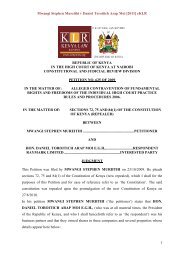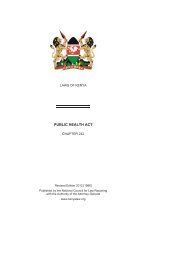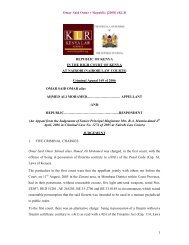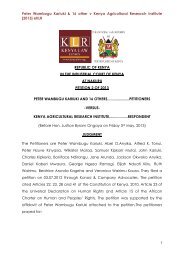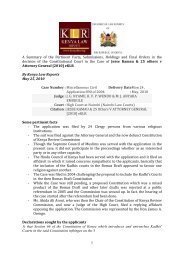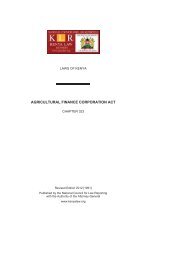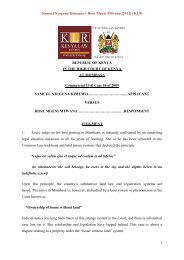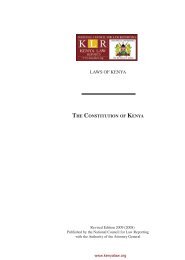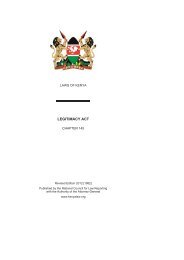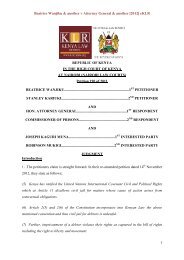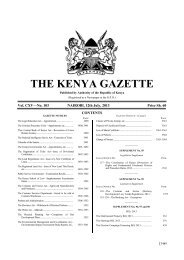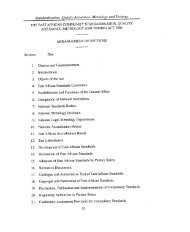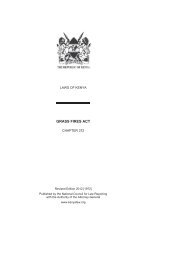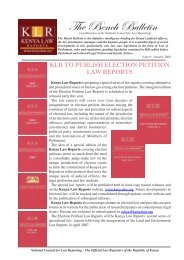Bench Bulletin - Issue 12 - Kenya Law Reports
Bench Bulletin - Issue 12 - Kenya Law Reports
Bench Bulletin - Issue 12 - Kenya Law Reports
You also want an ePaper? Increase the reach of your titles
YUMPU automatically turns print PDFs into web optimized ePapers that Google loves.
KENYA LAW REPORTS<br />
BENCH BULLETIN<br />
FROM THE COURTS — HIGH COURT<br />
8. Election posters not disclosing the name and address of the printers was an election offence under the Election<br />
Offences Act punishable by imprisonment for up to four years. Where any person was aggrieved, such a person was<br />
required to lodge a criminal complaint with the police. The fact that a party to an election petition did not specify on<br />
the face of his election poster the name and the address of the printer or publisher could not result in the nullification<br />
of an election.<br />
9. Although the petitioner proved that the first respondent’s supporters distributed leaflets that were defamatory<br />
of his character, such distribution was localized in scope that it could not be said to have materially and substantially<br />
affected the conduct and the results of the parliamentary election.<br />
10. The petitioner failed to establish the claim that the third respondent was influenced by the first respondent in<br />
the employment of the presiding officers and polling clerks during the said parliamentary elections.<br />
11. The election offence of bribery had been established. However, the culprit was a civic candidate in the said elections<br />
and court could not therefore reach a conclusion with certainty that the said culprit was bribing voters on his own<br />
behalf or on behalf of the first respondent as he was in the same party as the first respondent.<br />
<strong>12</strong>. The election regulations were meant to govern the conduct of the election from the time the voters were registered<br />
to the time the results of the elections were announced. It provided an elaborate procedure by which presiding officers<br />
were required to conduct an election and later announce results. The election regulations were meant to entrench and<br />
promote the principles of free, transparent and fair elections.<br />
13. The participation by the Electoral Commission of <strong>Kenya</strong> (ECK) in the nominations of a political party that was<br />
to later contest the general elections was against the principles of independence and impartiality and against the<br />
ECK’s own Code of Conduct which prohibited its officials from associating with a political party. An electoral body was<br />
supposed to conduct elections impartially and even a seemingly innocent association with any of the contesting parties,<br />
particularly the party in power, would raise questions as to its impartiality and neutrality.<br />
14. A Form 16A which was not signed by a Presiding Officer could not constitute valid results capable of being accepted<br />
for tallying by a Returning Officer. Further, a Form 16A which was not authenticated by the stamp of the electoral body<br />
could not be said to contain valid results. The Returning Officer had accepted invalid results and included them in the<br />
final results expressed in Form 17A.<br />
15. Forms 16A in respect of some of the polling stations had been filled by persons who were not in ECK’s official list<br />
of designated Presiding Officers. The Returning Officer had wrongly delegated the responsibility.<br />
16. The presiding officers did not provide statutory comments as required by the law and further failed to allow the<br />
agents of the candidates to authenticate the results by signing on the Form 16As.<br />
17. The Election Regulations required a Presiding Officer to request each candidate or their agents to sign against<br />
the results on Form 16A and where a candidate or agent was absent or failed to sign, the Presiding Officer was to state<br />
the absence or the reasons for the lack of the signature. The participation of candidates or agents in an election was<br />
not incidental or cosmetic to the election process but an important component of it. Failure to state the reasons was a<br />
breach of a mandatory legal requirement and it rendered invalid the results contained in the Forms.<br />
18. The third respondent failed to verify or confirm that the results filled in the Form 17A were the true and correct<br />
results of all the polling stations in the constituency. The Form 17A was not dated. It was evident that the third<br />
respondent, if at all, filled the Form 17A in the absence of the candidates. That was the reason why the candidates,<br />
including the first respondent, failed to append their respective signatures on the said Form 17A. The said Form 17A<br />
could not therefore be said to be a valid legal instrument or statutory form containing the declared results.<br />
19. Whereas the regulations did not specify what ought to be done where there are cancellations and alterations,<br />
common sense dictated that where there was a cancellation or alteration in a statutory form, the same should be<br />
countersigned by the concerned official. In the case of electoral documents, it was important that the statutory forms<br />
which contain results that will invariably be required to be verified by other parties, including the members of the<br />
public, should be written without any alterations or cancellations. The cancellations and alterations in the Form 16As<br />
produced in the court raised question regarding the veracity and authenticity of the said results.<br />
20. The Electoral Commission had a duty to inculcate and imbue confidence in the electorate that its process was<br />
transparent, free and fair.<br />
21. There was a wide discrepancy in the total vote tally between the parliamentary, civic and presidential election. In<br />
normal circumstances, the variation in the tallies of the total votes cast for all the civic, parliamentary and presidential<br />
candidates would be marginal. The difference of over 5,000 votes between the parliamentary vote on the one hand and<br />
the presidential and the civic vote on the other was evidence of serious electoral malpractice.<br />
22. The totality of the electoral irregularities was of such a magnitude that the parliamentary election could not be<br />
said to have been free and fair.<br />
Petition allowed<br />
<strong>Issue</strong> <strong>12</strong>: April-June 2010<br />
65



